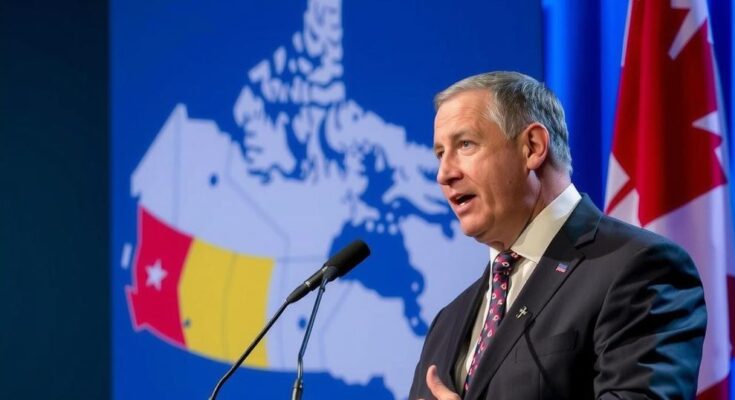The proposed 25% tariff on Canadian imports by President-elect Trump has been met with substantial criticism, particularly from Ontario Premier Doug Ford, who labeled it as “devastating.” Discussions between Trudeau and Trump aim to address concerns surrounding trade and border security. Canadian ministers reiterate the significance of the trading partnership while fluctuations in illegal crossings and potential negotiations loom large over this sensitive international issue.
The proposed tariff by US President-elect Donald Trump to impose a 25% tax on imports from Canada, Mexico, and China has elicited significant concern in Canada. Ontario’s Premier, Doug Ford, labeled this proposal as “devastating,” articulating fears regarding its potential impact on employment and trade relations. In discussions between Prime Minister Justin Trudeau and Trump, officials sought to address the matter in an atmosphere of cautious diplomacy. Canadian ministers highlighted the critical importance of the US-Canada trading partnership, particularly noting that Canada supplied 60% of US crude oil imports in the previous year.
President-elect Trump has framed the tariff as part of a broader strategy to curtail illegal immigration and drugs entering the United States, particularly fentanyl. Other provincial leaders echoed Ford’s sentiments, emphasizing the urgent need for a meeting among all regional premiers to discuss the repercussions of such tariffs. However, some voices advised measured responses, arguing that Trump’s threats may serve as a negotiation tactic rather than an imminent policy change.
The discourse surrounding the proposed tariffs also involves considerations about national security and illicit crossings at the northern border, which Trump has categorized as an area of vulnerability. Reports indicate a notable increase in unlawful entries into the U.S. from Canada in recent times, raising alarms among border security officials. Yet experts point out that incidents at the northern border remain fewer than those at the southern border, which continues to attract more significant attention for illegal crossings.
The tension surrounding trade tariffs between the United States and Canada has historical roots, stemming from the complex economic interdependence shared between the two nations. The proposed tariffs from President-elect Trump signal a significant shift in trade policy, which may jeopardize established partnerships. Canada plays a pivotal role in the U.S.’s economy, being a major supplier of goods including crude oil and manufacturing components. Concerns regarding immigration and drug trafficking have recently intensified, further complicating the discourse on border security and international trade relationships.
In summary, the proposed 25% tariff by President-elect Trump has ignited substantial criticism from Canadian leaders, particularly regarding its potential damage to the economies of both Canada and the U.S. While the discussions between the two countries remain ongoing, the impact of this tariff proposal on the intricate trade relations and the broader implications for border security continue to be key concerns. The situation calls for measured responses and potential reconsideration of negotiation strategies to ensure continued cooperation between the neighboring nations.
Original Source: www.bbc.com




